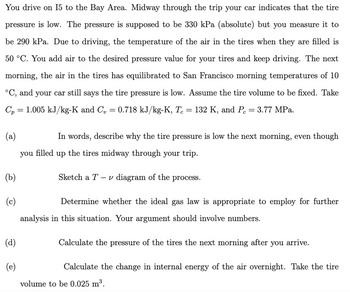
Elements Of Electromagnetics
7th Edition
ISBN: 9780190698614
Author: Sadiku, Matthew N. O.
Publisher: Oxford University Press
expand_more
expand_more
format_list_bulleted
Topic Video
Question

Transcribed Image Text:You drive on I5 to the Bay Area. Midway through the trip your car indicates that the tire pressure is low. The pressure is supposed to be 330 kPa (absolute) but you measure it to be 290 kPa. Due to driving, the temperature of the air in the tires when they are filled is 50 °C. You add air to the desired pressure value for your tires and keep driving. The next morning, the air in the tires has equilibrated to San Francisco morning temperatures of 10 °C, and your car still says the tire pressure is low. Assume the tire volume to be fixed. Take \( C_p = 1.005 \, \text{kJ/kg-K} \) and \( C_v = 0.718 \, \text{kJ/kg-K}, \, T_c = 132 \, \text{K}, \) and \( P_c = 3.77 \, \text{MPa}. \)
(a) In words, describe why the tire pressure is low the next morning, even though you filled up the tires midway through your trip.
(b) Sketch a \( T - \nu \) diagram of the process.
(c) Determine whether the ideal gas law is appropriate to employ for further analysis in this situation. Your argument should involve numbers.
(d) Calculate the pressure of the tires the next morning after you arrive.
(e) Calculate the change in internal energy of the air overnight. Take the tire volume to be 0.025 m\(^3\).
Expert Solution
This question has been solved!
Explore an expertly crafted, step-by-step solution for a thorough understanding of key concepts.
This is a popular solution
Trending nowThis is a popular solution!
Step by stepSolved in 3 steps with 2 images

Knowledge Booster
Learn more about
Need a deep-dive on the concept behind this application? Look no further. Learn more about this topic, mechanical-engineering and related others by exploring similar questions and additional content below.Similar questions
- In a hypothetical diesel engine the fuel is compressed from 579mL to 32.9 mL. This rasies the temperature of the fuel form 25°C to its ignition temperature of 210°C. If the fuel begins at 1.00atm, what is the pressure of the fuel at its ignition temperature.? Express your answer to 1 decimal placearrow_forwardPlease don't provide handwritten solution ....arrow_forwardA U-tube manometer containing a light oil (specific gravity 0.7) is used to measure the static pressure of air (density 1.2 kg/m³) in a container. If the gauge pressure is 206 N/m², what is the indicated height of oil?arrow_forward
- The pressure of a car tire depends on the temperature of the air in the tire. While the air temperature is 25 degrees Celsius, the effective pressure is 250 kilo pascals. If the volume of the tire is 0.025 m³, what is the pressure that will occur when the temperature in the tire reaches 50 degrees Celsius?arrow_forwardThe pilot of a Boeing 767 determines that a total of 22,300 kilograms of jet fuel is needed to fly from Montreal to Edmonton. A floatstick check finds that there is 11,549 litres of fuel already in the tanks. How much fuel, expressed in litres, must be added to the tanks? The density of jet fuel varies with temperature. For the prevailing conditions take the density of the jet fuel to be 0.803 kg/L or equivalently 1.77 lb/L.arrow_forwardi need help with this question pleasearrow_forward
arrow_back_ios
arrow_forward_ios
Recommended textbooks for you
 Elements Of ElectromagneticsMechanical EngineeringISBN:9780190698614Author:Sadiku, Matthew N. O.Publisher:Oxford University Press
Elements Of ElectromagneticsMechanical EngineeringISBN:9780190698614Author:Sadiku, Matthew N. O.Publisher:Oxford University Press Mechanics of Materials (10th Edition)Mechanical EngineeringISBN:9780134319650Author:Russell C. HibbelerPublisher:PEARSON
Mechanics of Materials (10th Edition)Mechanical EngineeringISBN:9780134319650Author:Russell C. HibbelerPublisher:PEARSON Thermodynamics: An Engineering ApproachMechanical EngineeringISBN:9781259822674Author:Yunus A. Cengel Dr., Michael A. BolesPublisher:McGraw-Hill Education
Thermodynamics: An Engineering ApproachMechanical EngineeringISBN:9781259822674Author:Yunus A. Cengel Dr., Michael A. BolesPublisher:McGraw-Hill Education Control Systems EngineeringMechanical EngineeringISBN:9781118170519Author:Norman S. NisePublisher:WILEY
Control Systems EngineeringMechanical EngineeringISBN:9781118170519Author:Norman S. NisePublisher:WILEY Mechanics of Materials (MindTap Course List)Mechanical EngineeringISBN:9781337093347Author:Barry J. Goodno, James M. GerePublisher:Cengage Learning
Mechanics of Materials (MindTap Course List)Mechanical EngineeringISBN:9781337093347Author:Barry J. Goodno, James M. GerePublisher:Cengage Learning Engineering Mechanics: StaticsMechanical EngineeringISBN:9781118807330Author:James L. Meriam, L. G. Kraige, J. N. BoltonPublisher:WILEY
Engineering Mechanics: StaticsMechanical EngineeringISBN:9781118807330Author:James L. Meriam, L. G. Kraige, J. N. BoltonPublisher:WILEY

Elements Of Electromagnetics
Mechanical Engineering
ISBN:9780190698614
Author:Sadiku, Matthew N. O.
Publisher:Oxford University Press

Mechanics of Materials (10th Edition)
Mechanical Engineering
ISBN:9780134319650
Author:Russell C. Hibbeler
Publisher:PEARSON

Thermodynamics: An Engineering Approach
Mechanical Engineering
ISBN:9781259822674
Author:Yunus A. Cengel Dr., Michael A. Boles
Publisher:McGraw-Hill Education

Control Systems Engineering
Mechanical Engineering
ISBN:9781118170519
Author:Norman S. Nise
Publisher:WILEY

Mechanics of Materials (MindTap Course List)
Mechanical Engineering
ISBN:9781337093347
Author:Barry J. Goodno, James M. Gere
Publisher:Cengage Learning

Engineering Mechanics: Statics
Mechanical Engineering
ISBN:9781118807330
Author:James L. Meriam, L. G. Kraige, J. N. Bolton
Publisher:WILEY